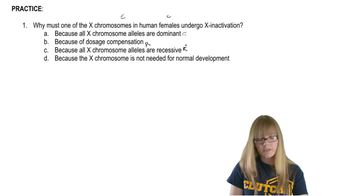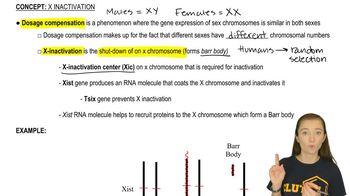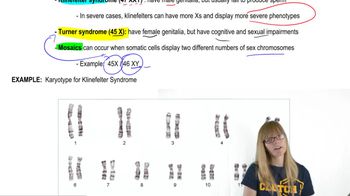Here are the essential concepts you must grasp in order to answer the question correctly.
Dosage Compensation
Dosage compensation is a genetic mechanism that balances the expression of genes on sex chromosomes between males and females. In mammals, this is primarily achieved through X-inactivation, where one of the two X chromosomes in females is randomly inactivated, ensuring that gene dosage is similar to that of males, who have one X and one Y chromosome.
Recommended video:
Purpose of X Inactivation
X-Inactivation
X-inactivation is a process that occurs in female mammals where one of the two X chromosomes is randomly silenced during early embryonic development. This results in a mosaic expression of X-linked genes, allowing females to maintain a similar level of gene expression from X-linked genes as males, thus addressing the potential imbalance in gene dosage.
Recommended video:
Sex Chromosomes
Sex chromosomes are a pair of chromosomes that determine the sex of an organism. In mammals, females typically have two X chromosomes (XX), while males have one X and one Y chromosome (XY). The presence of different sex chromosomes leads to variations in gene dosage, which is managed through mechanisms like dosage compensation to ensure proper development and function.
Recommended video:
 Verified step by step guidance
Verified step by step guidance Verified video answer for a similar problem:
Verified video answer for a similar problem:

